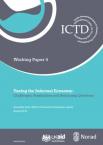ICTD Working Paper 12
This research explores relatively successful reforms of the local property tax system in the four largest city councils in Sierra Leone. Deriving lessons from differing outcomes across the four councils, it highlights three key messages about the determinants of successful reform. First, relatively modest and targeted support from the international community and the central government has been critical. However, the success of such initiatives must be grounded in a focus on longer-term, hands-on, local-level partnerships. Second, success is critically dependent on high-level reform leadership to overcome resistance, particularly from large property owners. In turn, the emergence of such political leadership appears to have been shaped by the relationship between political and economic elites, the relationship between local and central political parties, and the extent of local-level political competition. Finally, alongside the general importance of political leadership, reform strategies that are comparatively contractual can contribute to a virtuous cycle of improved governance, and help to build sustainable political support for continued reform.
